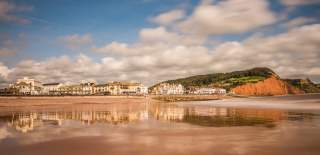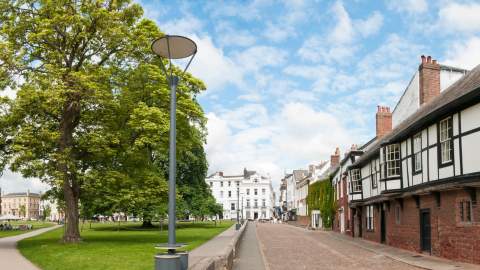Devon is awash with literary connections, from Agatha Christie who was born in Torquay and kept a holiday home in the English Rivera to Sir Arthur Conan Doyle who used the wilds of Dartmoor as inspiration for the Hound of the Baskervilles – there are connections to our favourite books everywhere, which is one of the reasons why Exeter in particular is internationally recognised as being a city of literature.
In fact, did you know that Exeter is one of just five UK cities to have the title of UNESCO City of Literature? It won the accolade in 2019 for having an unbroken 1000 year history of making books and popularising reading. Not only have some notable writers come from the city and its surroundings but one of Britain’s best loved publishing imprints was inspired by the city too! In fact if you’re a bibliophile, you might already be aware of Exeter’s place in Britain’s literary world, especially if you’re on booktok or bookstagram, where you will have seen the famous Penguin vending machine, which provides books to travellers using Exeter St David’s train station!
Whether you were already aware of Exeter’s literary connections or not, take a look at our brief guide to literary Exeter and make it your next bookish destination.
If you’re visiting the city, your first stop on your bookish tour of Exeter is the aforementioned Penguin vending machine in the train station at Exeter St Davids. The machine is a reference to Sir Allen Lane, the founder of the imprint, who came up with the idea of Penguin books while waiting for a train at Exeter St Davids following a meeting with his friend, Agatha Christie, who was still living in Devon at the time. According to Sir Allen, he found himself without a book to read and all that was on offer at the station were magazines and reprints of Victorian novels. so he decided that high quality, engaging and reasonably priced books should be available to everyone, everywhere. The following year, Penguin Books released their first ten titles, making history with the first paperbacks to enter the market. After founding Penguin, Sir Allen came up with a plan to put books in the hands of as many people as possible, creating the Penguincubator, a futuristic vending machine style creation that offered a selection of Penguin titles. Now, his dream has been realised in practical terms with the Penguin vending machine, which is quickly becoming famous on Instagram and is delighting regular readers and travellers alike.
Exeter isn’t just where the idea of one of Britain’s best loved publishing imprints was born. It is also home to the largest surviving poetry anthology from the Anglo-Saxon era, the 10th century Exeter Book, a collection of poems written in Old English which was owned by Leofric, the first Bishop of Exeter. The book is a UNESCO Artefact of Global Cultural Significance and is kept within the historic Exeter Cathedral, where you’ll also find several medieval manuscripts, the Exon Domesday book and Shakespeare’s second folio.
Another stop on our whistle stop tour of Exeter’s literary places of interest is Exeter University. The university has produced several top authors over the years, the best known probably being J K Rowling, the creator of a certain boy wizard. She studied at the uni and took inspiration from the nearby village of Ottery St Mary, among other places to create the Weasleys home of Ottery St Catchpole. Another Exeter alumni is the writer and teacher Gene Kemp. After leaving university, she settled in the city and taught at St Sidwell’s School which became the inspiration for her fictional Cricklepit School, which featured in many of her childrens’ novels, including her best known, the Turbulent Term of Tyke Tiler.
As well as producing several authors, the university’s library has one of the best archive collections in the UK and features plenty of literary works from writers linked to this part of the world, including Agatha Christie and Daphne du Maurier.
Next up is the Turk’s Head, a pub and microbrewery in the high street. Though it has been refurbished, this was a favourite watering hole of Charles Dickens when he was in town. There is even a spot in the pub known as Dickens’ Corner, which is where he would sit with a drink and people watch. It is said that some of the characters in the Pickwick Papers were inspired by patrons he noticed hanging about the pub. It wasn’t just the Pickwick Papers which found its origins in Exeter, he wrote the opening chapters of Nicholas Nickleby while staying just outside the city. Why Exeter you might ask? Well, it’s understandable, Dickens is often associated with Victorian London after all, but he actually spent a lot of his early career in Devon. For a time he was working as a journalist and stayed with his friend, Thomas Latimer, the editor of the Western Times on Fore Street. He covered the Exeter City Council Elections and loved his time here so much that he rented a cottage, which his parents lived in for a time and where he would stay to write. There is a plaque commemorating both Dickens and Latimer at 143 Fore Street Exeter, so look out for it during your visit.
Another local writer who has a Blue Plaque is Sabine Baring Gould. His family owned the manor house at Lewtrenchard and he was born in the St Sidwell’s area of Exeter. He was primarily an Anglican priest and is best known for writing hymns, but was also known to create collections of local folk songs with the help of the people of Devon and several novels. His Book of Were Wolves is frequently cited in studies of lycanthropy and was said to have inspired fellow writer, Bram Stoker. Stoker not only has Dracula shape shift into a wolf in the course of the novel, but he also has the character of Jonathan Harker set off for Transylvania from Cathedral Close – a subtle nod to Baring Gould and his influence. Another fun fact, Stoker’s brother is buried in Exeter!
That’s not where the connections end, romance writer and suffrage campaigner Mary Patricia Willcocks, who was born on Dartmoor, moved to Exeter after the success of her first novel and remained in the city until her death. She was credited for organising various campaigns for women’s suffrage during her lifetime, including a march from Land’s End to Hyde Park in 1913. You can also find a plaque dedicated to her on Pennsylvania Road. George Gissing is another writer who called Exeter home for a time, he also had connections to Budleigh Salterton, where he spent some time living with fellow novelist, H G Wells, and was known to frequent some of the city’s best loved spots, including RAMM.
Interested in a literary adventure in Exeter this year?
Find places to stay and other attractions below.



